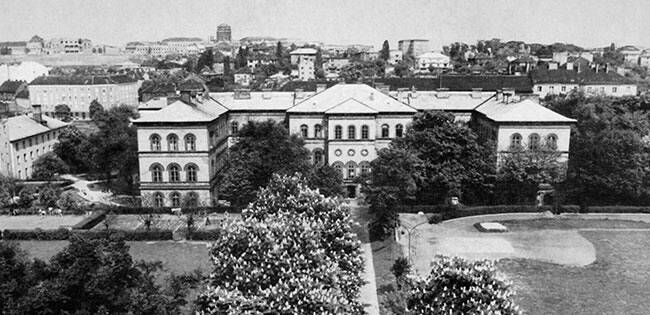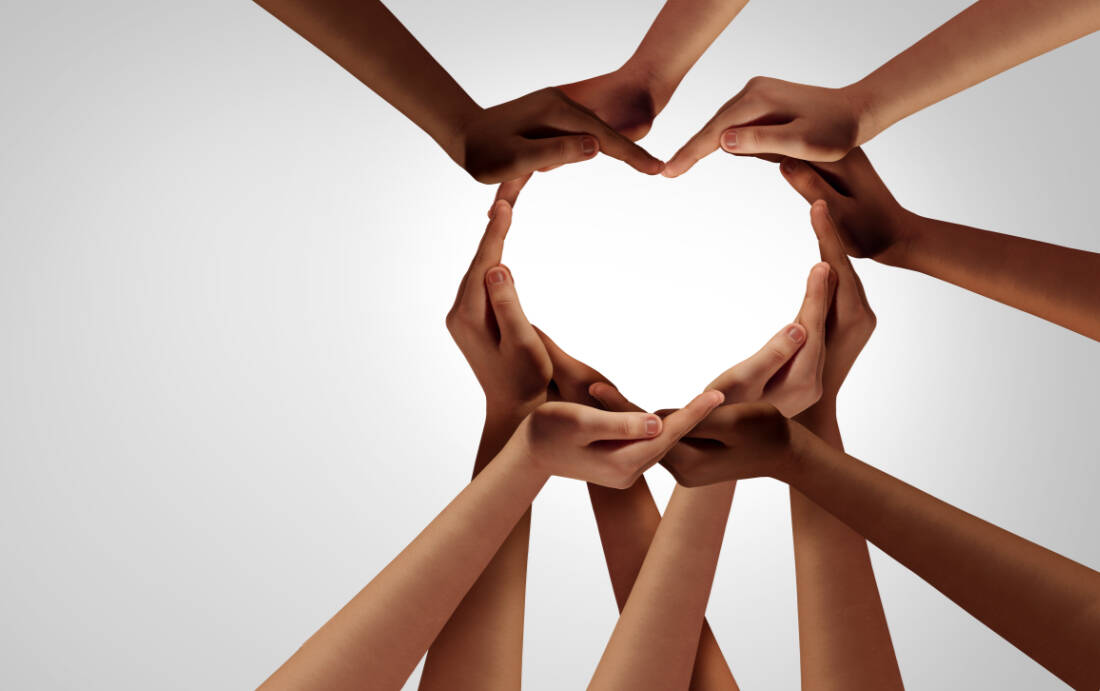Olympic Champions of the University of Physical Education | Honorary Doctors
Olympic Champions of the University of Physical Education
Athletics
- Angéla Németh (javelin throw, 1968, Mexico City)
- Imre Németh (hammer throw, 1948, London)
- Miklós Németh (javelin throw, 1976, Montreal)
- Gyula Zsivótzky (hammer throw, 1968, Mexico City)
Fencing
- Árpád Bárány (epée, team, 1964, Tokyo)
- Imre Bujdosó (sabre, team, 1988, Seoul)
- Judit Mendelényi-Ágoston (foil, team, 1964, Tokyo)
- Tímea Nagy (epée, individual, 2000, Sydney, 2004, Athens)
- György Nébald (sabre, team, 1988, Seoul)
- Tibor Pézsa (sabre, individual, 1964, Tokyo)
- Ildikó Rejtő (foil individual and team, 1964, Tokyo)
- Lídia Sákovits-Dömölky (foil, team, 1964, Tokyo)
- Ildikó Tordasi (foil, individual, 1976, Montreal)
Gymnastics
- Erzsébet Gulyás-Köteles (hand apparatus team, 1956, Melbourne)
- Ágnes Keleti (free exercise, 1952, Helsinki; free exercise, uneven bars, balance beam, hand apparatus team, 1956, Melbourne)
- Aliz Kertész (hand apparatus team, 1956, Melbourne)
- Olga Lemhényi-Tass (hand apparatus team, 1956, Melbourne)
- Zoltán Magyar (pommel horse, 1976, Montreal; 1980, Moscow)
Kayak-canoe
- László Fábián (K-210 000 m, 1956, Melbourne)
- László Foltán (C-2 500 m, 1980, Moscow)
- Zsolt Gyulay (K-1 500 m, 1988, Seoul)
- György Kolonics (C-2 500 m, 1996, Atlanta; 2000, Sydney)
- Katalin Kovács (K-2 500 m, 2004, Athens; 2008, Beijing)
- Rita Kőbán (K-1 500 m, 1996, Atlanta)
- János Parti (K-1 1000 m, 1960, Rome)
- Botond Storcz (K-4 1000 m and K-2 500 m, 2000, Sydney)
- Tibor Tatai (C-1 1000 m, 1968, Mexico City)
- István Vaskuti (C-2 500, 1980, Moscow)
Modern Pentathlon
- András Balczó (team, 1960, Rome, 1968, Mexico City, individual, 1972, Munich)
- Gábor Bendek (team, 1952, Helsinki)
- László Fábián (team, 1988, Seoul)
- János Martinek (individual and team, 1988, Seoul)
- Attila Mizsér (team, 1988, Seoul)
- Ferenc Németh (individual and team, 1960, Rome)
- István Szondy (team, 1952, Helsinki)
- Zsuzsa Vörös (individual, 2004, Athens)
Shooting
- László Hammerl (small bore rifle, 50m, prone position, 1964, Tokyo)
Soccer
- Ferenc Bene (1964, Tokyo)
- József Bozsik (1952, Helsinki)
- Jenő Buzánszky (1952, Helsinki)
- Jenő Dalnoki (1952, Helsinki)
- Antal Dunai (1968, Mexico City)
- József Gelei (1964, Tokyo)
- Gyula Grosics (1952, Helsinki)
- Nándor Hidegkuti (1952, Helsinki)
- Kálmán Ihász (1964, Tokyo)
- László Keglovits (1968, Mexico City)
- Imre Komora (1964, Tokyo)
- Mihály Lantos (1952, Helsinki)
- Dezső Novák (1964, Tokyo; 1968, Mexico City)
- Miklós Szalai (1968, Mexico City)
- Antal Szentmihályi (1964, Tokyo)
- Lajos Szűcs (1968, Mexico City)
Swimming
- Attila Czene (200 m medley, 1996, Atlanta)
- Tamás Darnyi (200 and 400 m medley, 1988, Seoul; 200 and 400 m medley, 1992, Barcelona)
- Ágnes Kovács (200 m breaststroke, 2000, Sydney)
- Ilona Novák (4×100 m freestyle relay, 1952, Helsinki)
- Norbert Rózsa (200 m breaststroke, 1996, Atlanta)
- József Szabó (200 m breaststroke, 1988, Seoul)
- Éva Székely (200 m breaststroke, 1952, Helsinki)
Water polo
- Tibor Benedek (2000, Sydney; 2004, Athens; 2008, Beijing)
- Antal Bolvári (1952, Helsinki; 1956, Melbourne)
- Jenő Brandi (1936, Berlin)
- Zoltán Dömötör (1964, Tokyo)
- Tamás Faragó (1976, Montreal)
- László Felkai (1964, Tokyo)
- István Gergely (2004, Athens; 2008, Beijing)
- Dezső Gyarmati (1952, Helsinki; 1956, Melbourne; 1964, Tokyo)
- István Hevesi (1956, Melbourne)
- Tivadar Kanizsa (1956, Melbourne; 1960, Rome)
- György Kenéz (1976, Montreal)
- János Konrád (1976, Montreal)
- Zoltán Kósz (2000, Sydney)
- Kálmán Markovits (1952, Helsinki; 1956, Melbourne)
- Tamás Märcz (2000, Sydney)
- Dénes Pócsik (1964, Tokyo)
- Péter Rusorán (1964, Tokyo)
- Ádám Steinmetz (2004, Athens)
- Bulcsú Székely (2000, Sydney)
- Károly Szittya (1952, Helsinki)
- István Szívós, Jr, (1976, Montreal)
- Attila Vári (2000, Sydney; 2004, Athens)
Wrestling
- Greco-Roman
- Imre Hódos (flyweight, 1952, Helsinki)
- Ferenc Kocsis (welterweight, 1980, Moscow)
- Norbert Növényi (light heavyweight, 1980, Moscow)
- Imre Polyák (featherweight, 1964, Tokyo)
- Miklós Szilvásy (welterweight, 1952, Helsinki)
- János Varga (flyweight, 1968, Mexico City)
- Freestyle
- Károly Kárpáti (lightweight, 1936, Berlin)
Honorary Doctors
1981
- Ottó Szymiczek (Greece)
- Jenő Koltai (Hungary)
- Kleantisz Paleologosz (Greece)
1985
- Zbigniew Krawczyk (Poland)
- Gerhard Lukas (German Democratic Republic)
- Vlagyimir Agajevec (Soviet Union)
- Endre Burka (Hungary)
1987
- János Pálfai (Hungary)
- Juan Antonio Samaranch (Spain)
1989
- Joao Havelange (Brazil)
1990
- Kenneth H. Cooper (United States of America)
1991
- Charles D. Spielberger (United States of America)
1992
- Primo Nebiolo (Italy)
- Paavo V. Komi (Finland)
- William D. Ross (Canada)
1993
- Marcel Hebbelinck (Belgium)
1994
- Carmelo Bosco (Italy)
- R. N. Aebersold (United States of America)
- Joachim Mester (Germany)
1998
- J. E. L. Carter (New Zealand-United States of America)
- B. H. Heath-Roll (United States of America)
- George Eisen (United States of America)
- M. S. Yuhasz (Canada)
1999
- P. O. Astrand (Sweden)
- K. Mbaye (Senegal)
2000
- Emmanuel Van Praagh (France)
2001
- Han C. G. Kemper (The Netherlands)
2002
- Jacques Rogge (Belgium)
- John Holloszy (United States of America)
- Goto Sataro (Japan)
2003
- Eberhard Mensing (Germany)
- László Vigh (Hungary)
2004
- Albert W. Taylor (Canada)
2005
- Tibor Hortobágyi (United States of America)
2006
- Hideki Ohno (Japan)
2007
- Gertrud Pfister (Germany)
2008
- Kelvin J. A. Davies (United States of America)
2009
- Bruno Grandi (Italy)
- Jerzy Kosiewicz (Poland)
- Péter Sótonyi (Hungary)
2010
- István Boldogh (United States of America)
2011
- James S. Skinner (United States of America)
2012
- Jurgen M. Steinancker (Germany)
2013
- Paul G. M. Lutten (Netherlands)
2016
- Ádám Kiss (Hungary)
- Mitsuru Higuchi (Japan)
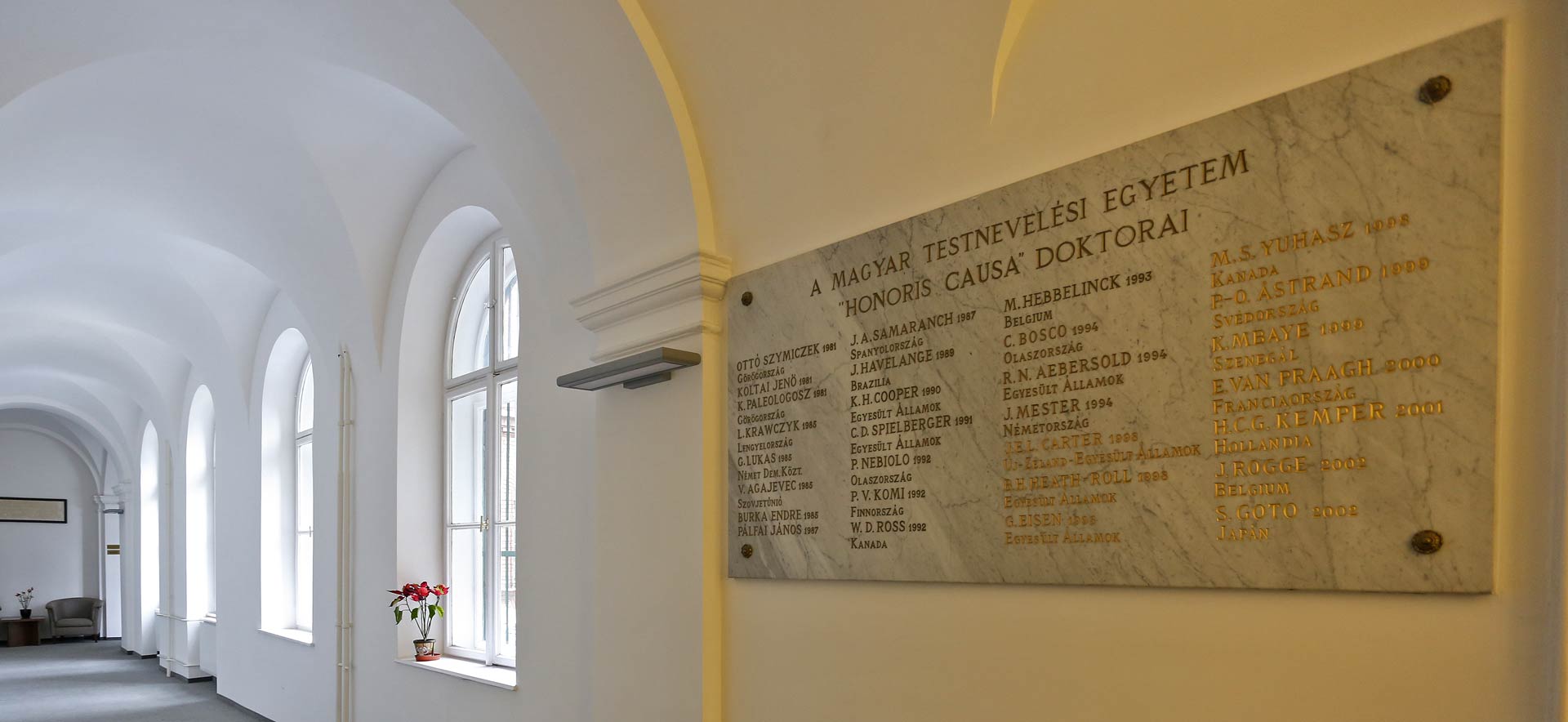
The ceremonial opening of the first academic year was in November, 1925. The sport club of the School was organized in the same year. At that time the institution provided college level education through a 3-year training which was extended to 4 years in 1929.
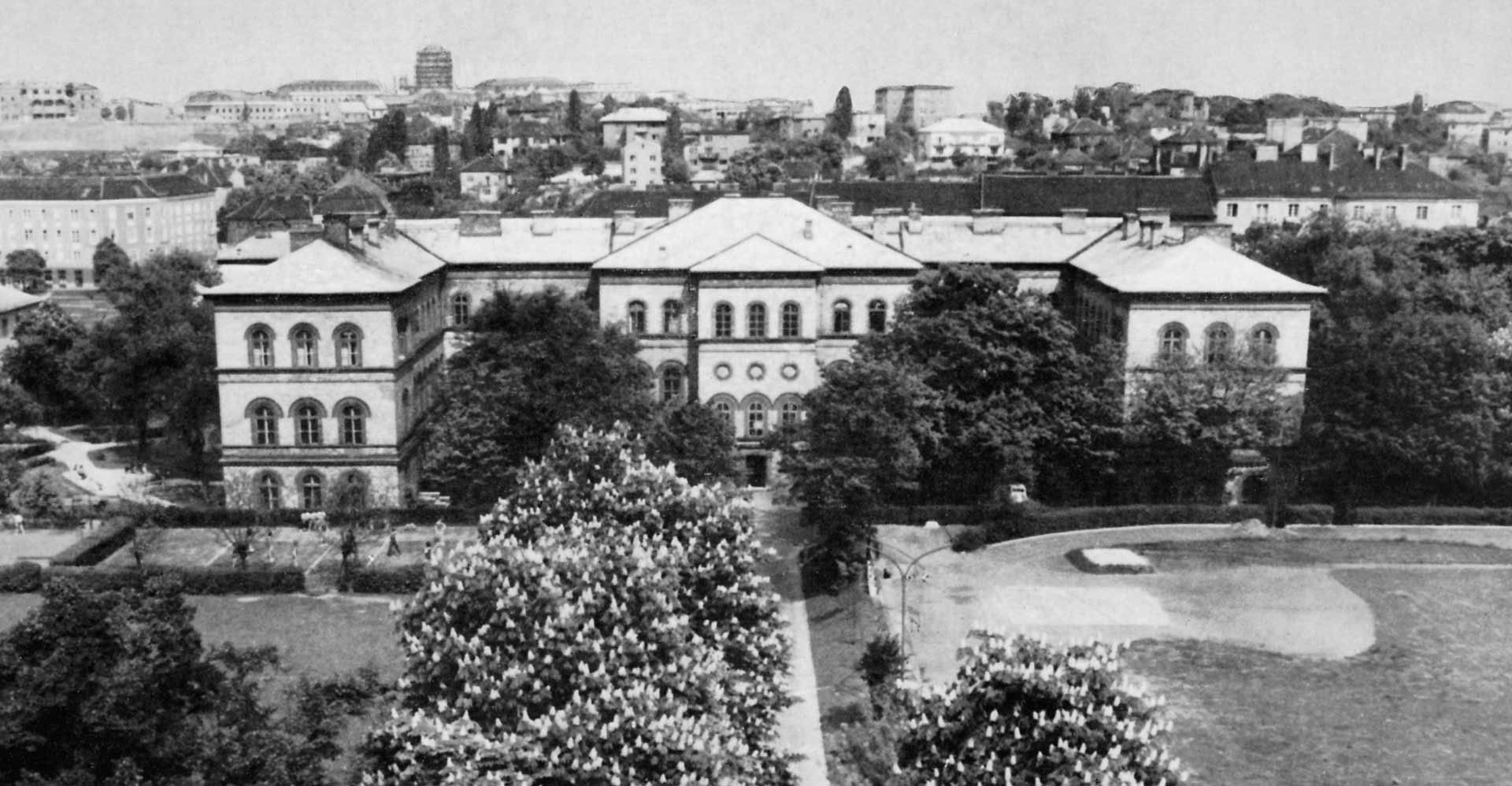
After having closed its gates during World War II the College resumed operation in February 1946. New departments were formed in 1949–50 along with reformed curriculum, new rules and standards of organization.
In 1975, celebrating its 50 year-jubilee, the College was granted university status and in 1985 received full university accreditation. In 1997 Hungarian authorities gave the right to the University to provide Doctoral Programs in the field of Sport Sciences and Education.
Parallel to the Hungarian programs the Physical Education Program taught in English language was introduced in 1993 giving the opportunity to foreign students to study in an international environment. It was followed by the Human Kinesiology Program in English three years later. The degrees granted in the Hungarian and English Programs are equivalent. Students are required to take examination at the end of the courses and by the end of the program, to prepare a thesis which must be defended in front of an examination board. Studies are finished with the Comprehensive State Examination. Degrees are presented annually at the Graduation Ceremony in July.
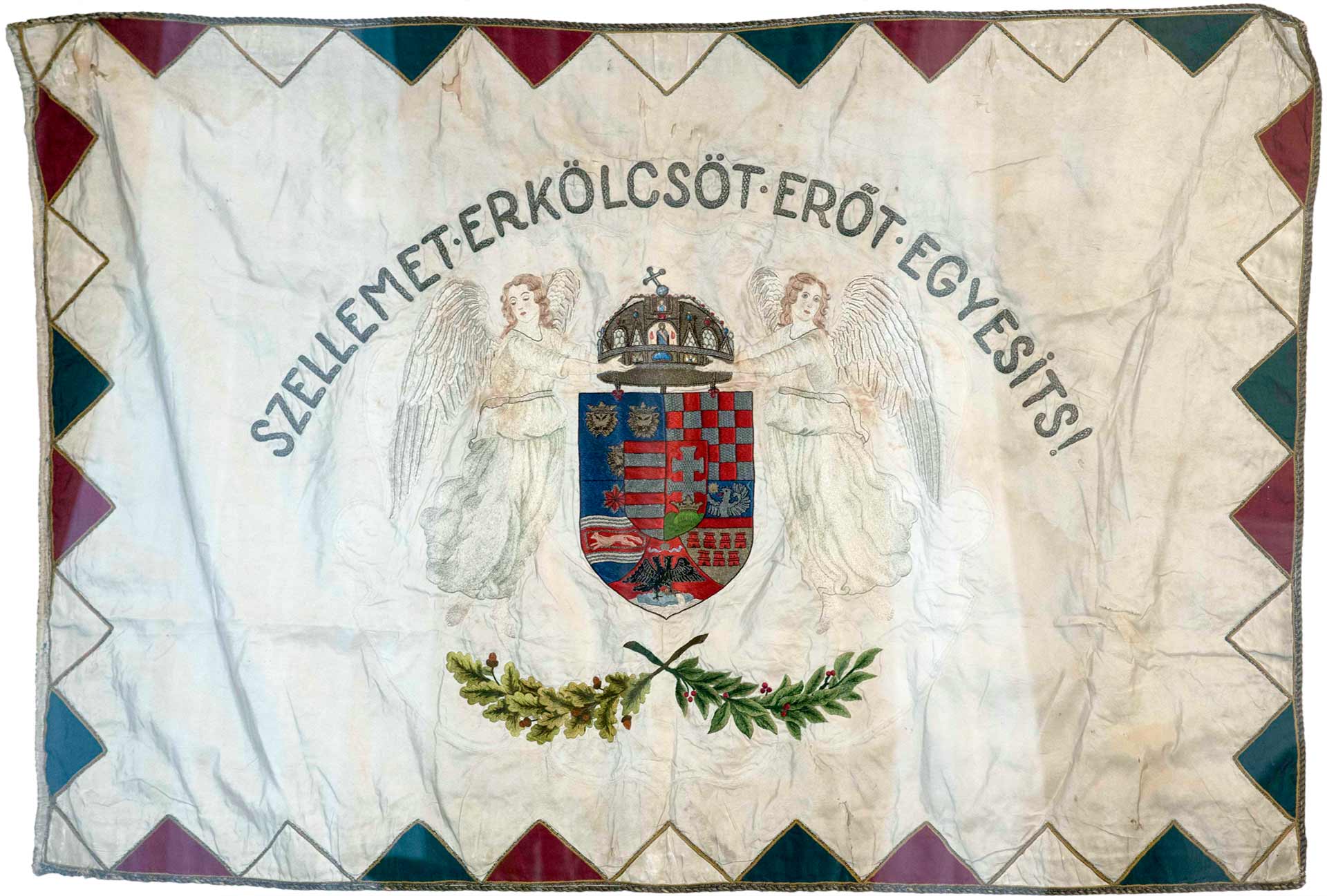
The historic flag of the University with our motto: “Where strength, mind and spirit unite.”
The Hungarian University of Sports Science (TF) features the preservation of traditions and continuous adaptation at the same time, in line with the criteria of the given age. Although a lot has changed over the years, its traditions live on, filled with new spirit while opening the windows of the university to the world. TF and its faculty, athletes and alumni are well-known globally for achievements in various areas of the sport profession, and our educators and trainers are respected all around the world.
If one not only wishes to be a great physical education teacher, physiotherapist, coach, sport manager, recreation, human kinesiology, health or sport science expert, but also wishes to pursue a scientific career, the Hungarian University of Sports Science is an ideal choice. This is the only university in Hungary where a PhD degree in sport science can be obtained, and TF serves as a career incubation space as well as a life-long professional support for our students and alumni.
The coaches of a number of Olympic, world and European champions have completed their studies at the Hungarian University of Sports Science or its predecessors. Amongst our Honorary Doctors, there are outstanding representatives from international sports diplomacy and sports science.
The Hungarian University of Sports Science is one of the oldest, most successful and professionally acclaimed universities for physical education and sports science in Central Europe. We greatly respect and value our legacy, preserve our traditions and continuously explore innovative methods in education and research. The latter meet 21st century expectations for higher education as well as our students’ expectations of firm knowledge, quality educators and services, along with great extracurricular experiences. Our management is dedicated to serving generations of undergraduate, graduate and postgraduate Hungarian and international students. Our faculty includes globally-renowned educators. Our students and alumni are high achievers in various areas of sports and science.
The university, traditionally called "TF", is the proud home of numerous Olympic champions, great sports coaches, educators and recreation experts. The TF community provides support throughout the careers of our students and alumni, helping them to aspire personally and professionally and enjoy a life-long career support. TF is currently involved in a major campus reconstruction and expansion project. The infrastructural development runs parallel with substantial development in our educational programs and research portfolio, quality assurance as well as a complex internationalization initiative, including mobility services, English language programs and strategic institutional partnerships.
We are pround to announce that the first two phases of the campus development were completed. The campus's old buildings used for educational purposes were renovated, and the new main building and the multifunctional sports complex was opened, thus opening up new ways of teaching, training and carrying out research on European level.
As a result of our modern curriculum, multifunctional sports facilities and community spaces and events, our students enjoy the opportunity to obtain competitive knowledge that meets labor market requirements while accumulating lifelong experiences with unique TF student life. Our dedication also serves larger aspirations of improving the health and wellness of Hungarians and those beyond our borders as well.


